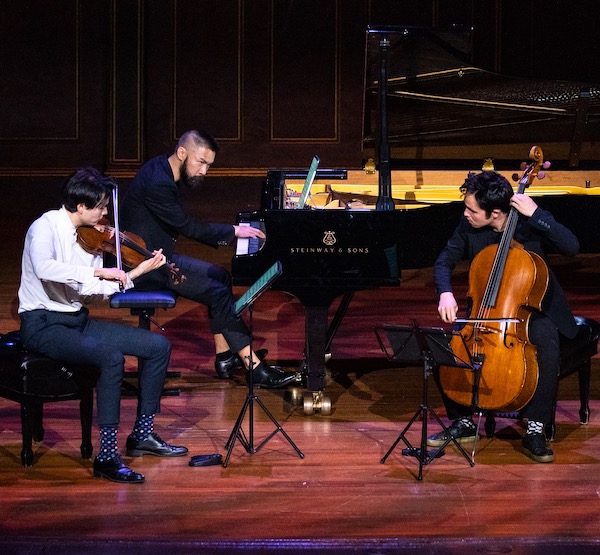Junction Trio delivers revelatory Ravel and Schumann in sterling Celebrity Series debut

The Junction Trio (violinist Stefan Jackiw, pianist Conrad Tao and cellist Jay Campbell) performed Saturday night at Jordan Hall for the Celebrity Series. Photo: Robert Torres
There was something conspicuously bracing about the Junction Trio’s concert on Saturday night at Jordan Hall. Maybe it had to do with the dose of emotional realism their program’s offerings of music by Amy Williams, Ravel, Thomas Morley, and Robert Schumann injected into the otherwise festive holiday season. Or, perhaps, it resulted from the group’s sheer verve on stage. Either way, the elements added up for a stimulating Celebrity Series debut.
Given the Junction’s membership—violinist Stefan Jackiw, cellist Jay Campbell, and pianist Conrad Tao—that result was anticipated but not necessarily foreordained. These musicians are, after all, accomplished soloists. Among such, the ability to subsume egos in a chamber ensemble setting isn’t always apparent.
Yet, for this triptych, equilibrium was achieved, and seemingly without much difficulty. That was astonishingly evident in the night’s traversal of Ravel’s Piano Trio in A minor.
On the one hand, the Junction’s interpretation of this 1914 masterpiece was a reading of extremes. Their dynamic range, for instance, was enormous, from the wafting, barely audible wisps of melody at the start of the Modéré to the thundering climax of the Passacaille. The score’s soloistic moments—like the piano’s first-movement refrains and the cello’s impassioned variations in the third—were rightly balanced and richly shaped.
But the thrill of the larger performance rested principally on two things. First, an obsession with small details, such as the blend of string harmonics at the end of the first movement and the articulations of the discreet, broken-note gestures by Jackiw and Tao in the Pantoum.
More important was the Junction’s ability to feel and convey this music, despite its textural and expressive variety, as a collective entity. This was most apparent in their invigorating account of the finale. Here, whether the music was flowing, passionate, inward, or vigorous, the group consistently breathed and moved as one.
Many of those same qualities also marked their take on Schumann’s Piano Trio No. 1. Even more than in the Ravel, this D-minor essay pits darkness and melancholy against a bright, shining sun. As such, it’s perhaps tailormade for Jackiw, whose sweet tone and intuitive grasp of the Romantic style were front-and-center Saturday night.
Certainly, the violinist delivered in the opening movement, phrasing his surging opening theme with a swelling, almost queasy tone that ceded way to security during the transition to the maggiore second subject. He was well-matched by his colleagues: the sul ponticello sequence in the development with Campbell was downright spooky; throughout, the movement never lost its corporate sense of urgency.
Meanwhile, the Scherzo, with its gracefully sculpted phrases and silken-voiced Trio, unfolded fetchingly and the third movement’s bold contrasts of tempo and character all spoke with potency. Only in the finale did Jackiw’s part sometimes over-dominate. But even then, it was excusable: Schumann’s violin writing here is, after all, bravura. Regardless, the overriding impression that emerged was one of hard-earned triumph over adversity, the movement’s radiant refrain decisively carrying all before it.
Similarly ecstatic was the Junction’s rendition of Morley’s “Christes Crosse.” An extract from the Elizabethan composer’s 1597 treatise, A Plain and Easie Introduction to Practicall Musicke, the piece offers a bit of chaotic, 16th-century musical fun: in essence, a simple tune is given an increasingly—and bizarrely complex—accompaniment.
On Saturday, Jackiw (mainly) had the melody; Campbell and Tao executed their fiendishly involved parts with a mix of dexterity and confidence that belied the cellist’s introduction to the piece (“We may or may not make it through,” he warned the audience beforehand, adding, with impeccable timing, “and you may or may not applaud”). Whether or not the performance was note-perfect was beside the point; its spirit was spot-on.
The last characteristic also applied to the East Coast premiere of Williams’ Bells and Whistles. A Celebrity Series co-commission, the score’s three connected sections focus on various mechanical subjects: clocks, trains, and bells.
Accordingly, rhythmic pulses and various extended techniques (playing under the piano’s lid, stroking the body of the cello) gave the first movement a sinister but playful aspect. Imitations of train whistles in the strings accompanied motoric keyboard figurations in the second, while the violin and cello echoed and sustained chiming piano chords in the last.
This is music that relies, maybe to a fault, on gesture. If the closing section seemed to overstay its welcome by a bit, the first two thoroughly held the ear. Either way, the whole piece is a wonderful showcase for the idiosyncratic Junction Trio, an ensemble that, as it vitally demonstrated on Saturday, knows neither stylistic nor musical boundaries.
The Celebrity Series presents Seong-Jin Cho playing music by Handel, Brahms, and Schumann at 3 p.m. Sunday at Jordan Hall. celebrityseries.org
Posted in Performances



